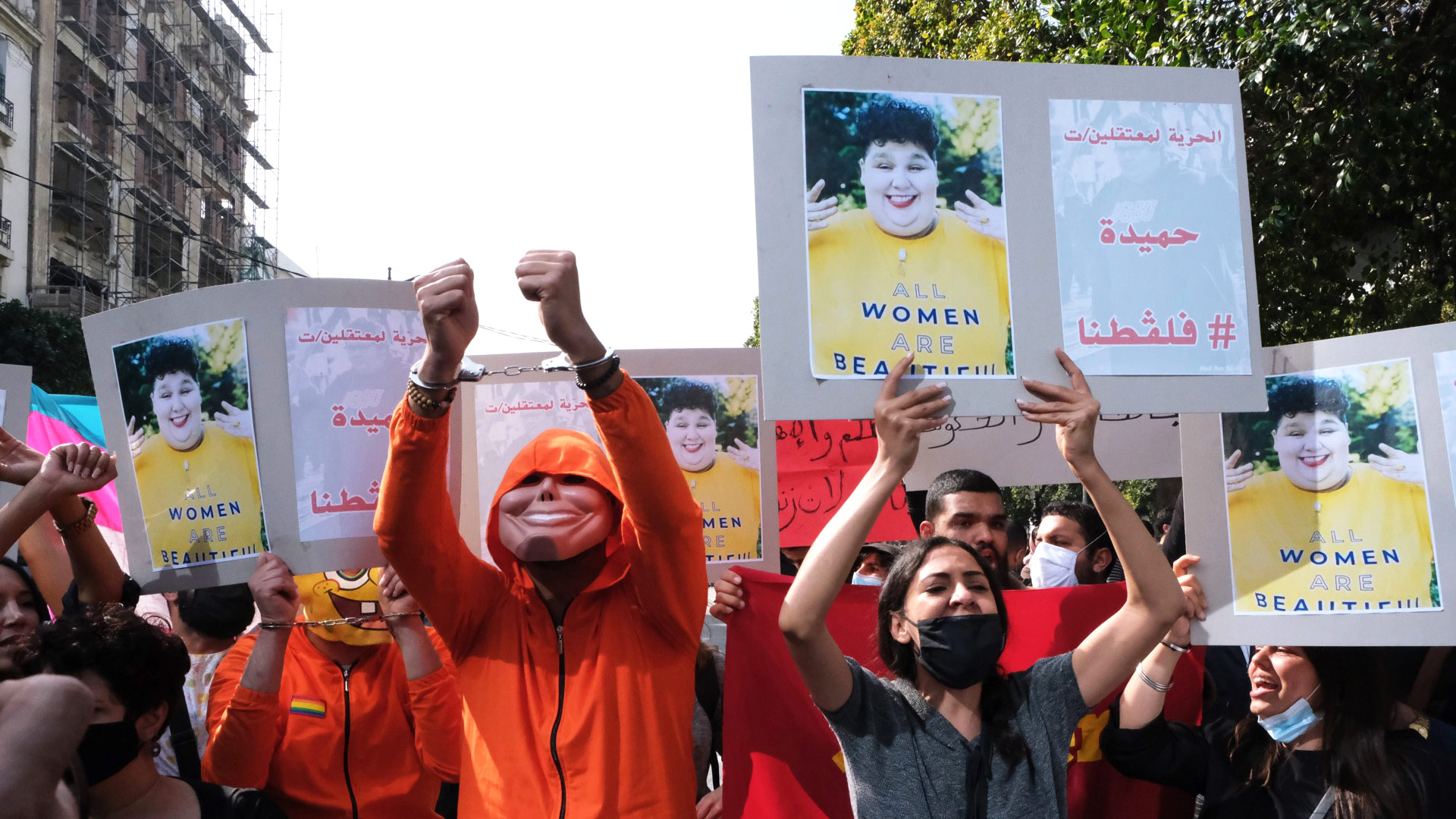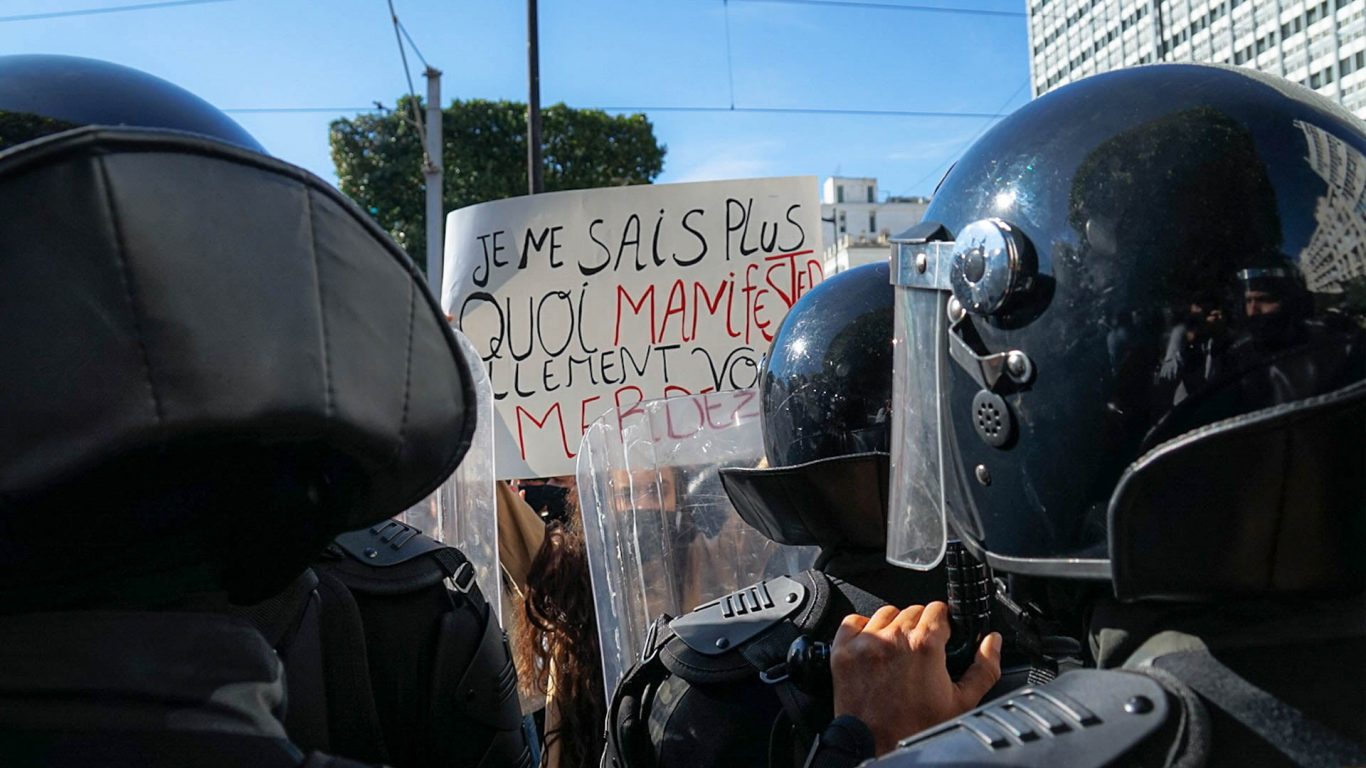On the same subject
In El Kamour, protesters are still demanding better access to natural resources and employment opportunities. In Ouled Jaballah, farmers denounce precariousness and inflation. In January 2021, the announcement of a four-day lockdown from 14 January, as well as the curfew extension, set fire to several neighbourhoods that were already heavily affected by unemployment, in a context where economic activity had been considerably hit due to the Covid-19 pandemic.
But demonstrations are also being organised in the capital, and various protesters and queer activists are uniting for a common cause. Across the street, the police restrain the crowd with their brand new shields that some protesters took upon themselves to spray-paint for the occasion. The demonstrators did not hesitate to use spectacular methods to create controversy: covering the police officers in paint, climbing the statue of Ibn Khaldun, tagging the stone base…
In the front lines of the procession, Rania Amdouni, an activist and member of the activist clown brigade, is banging her drum. Behind her, a sea of flags for queer, communist, anarchist, antifa and " Manich Msameh" (formed in opposition to the economic reconciliation law) causes intermingle with protest slogans, emphasising the intersectional approach and convergence of struggles.
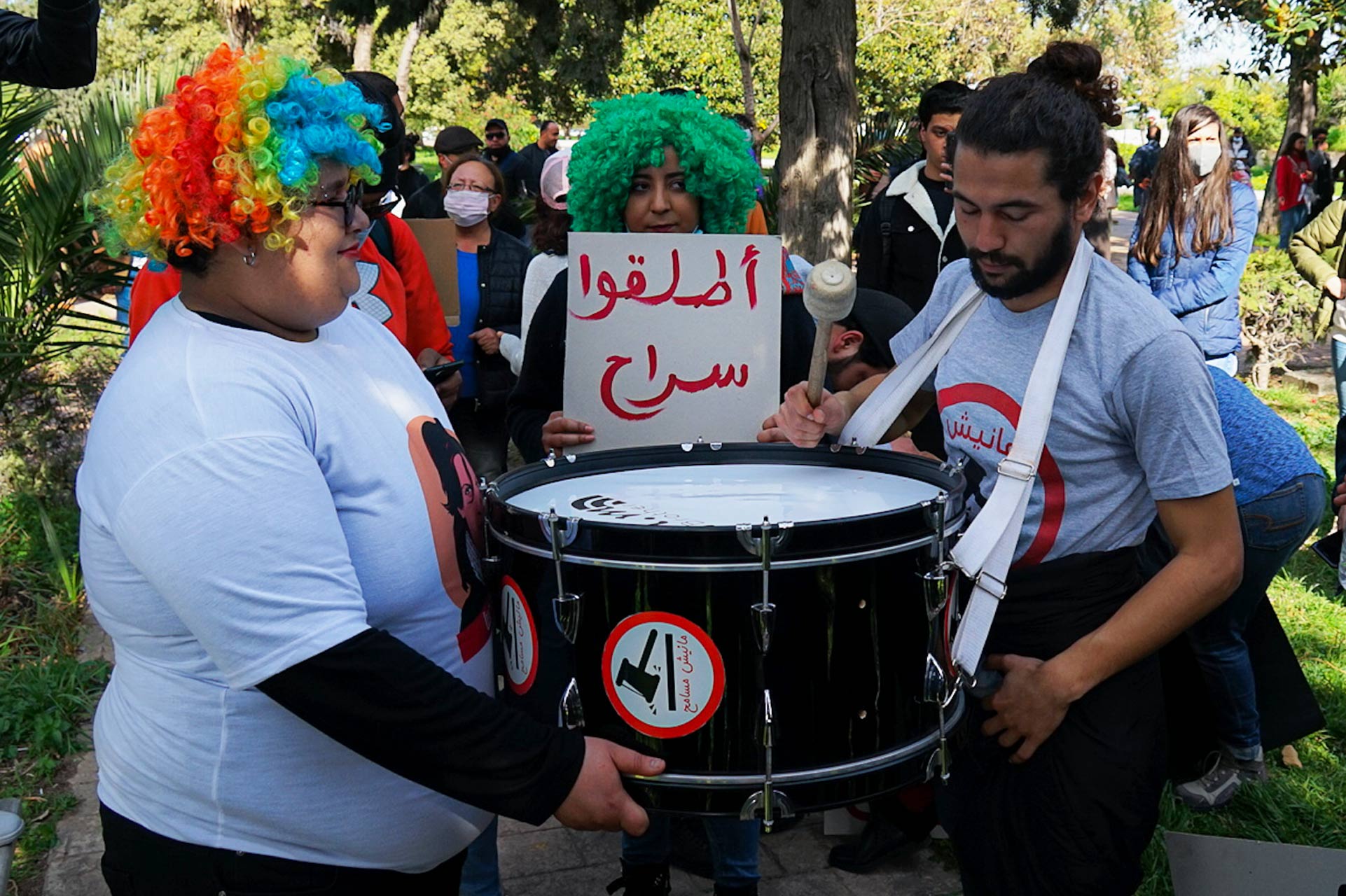
Demonstration on January 30, 2021, in support of those arrested during the protests. Rania Amdouni, wearing a T-shirt bearing the image of activist Lina Ben Mhenni, bangs on a drum together with an activist from the " Manich Msameh" movement. Photo credit: Issa Ziadia
increased visibility
The presence of flags and activists from the queer movement indicates an evolution and increased visibility for their cause. They are protesting for issues that go beyond their usual framework of demands (i.e. exclusively related to the multiple discriminations based on gender identity or sexual orientation). A convergence between various activist groups has thus taken place, whether queer, anarchist, feminist or related to youth from working class neighbourhoods.
" There was a clear intersection of people affected by police repression. In the same demonstration against this bill, you found ultras, feminists, human rights activists, leftists and the LGBT community - the people who, in my opinion, are at the intersection of all forms of repression and domination, so it is natural that they become allies in the struggle", says Hamza Nasri, a political and human rights activist and member of Damj (an association working for " inclusion and defence of minorities and marginalised groups, including the LGBT community").
Saif Ayadi, a queer activist in the same association, has participated in all of the demonstrations since October. He says he wants increased visibility and to participate more in international protests that do not only concern demands specific to LGBT people, such as the repeal of article 230 of the penal code. " When we saw the aggressions and the media machinery and impunity policy backing it up, we decided to also become more visible", explains Saif.
On the same subject
According to Abir Kréfa, a sociology lecturer and expert in gender related issues, " queer people were already severely repressed, and the confinement and the health care crisis aggravated this violence. As a result they found themselves on the front lines protesting police repression". This, according to her, was one of the reasons why they actively participated in recent demonstrations.
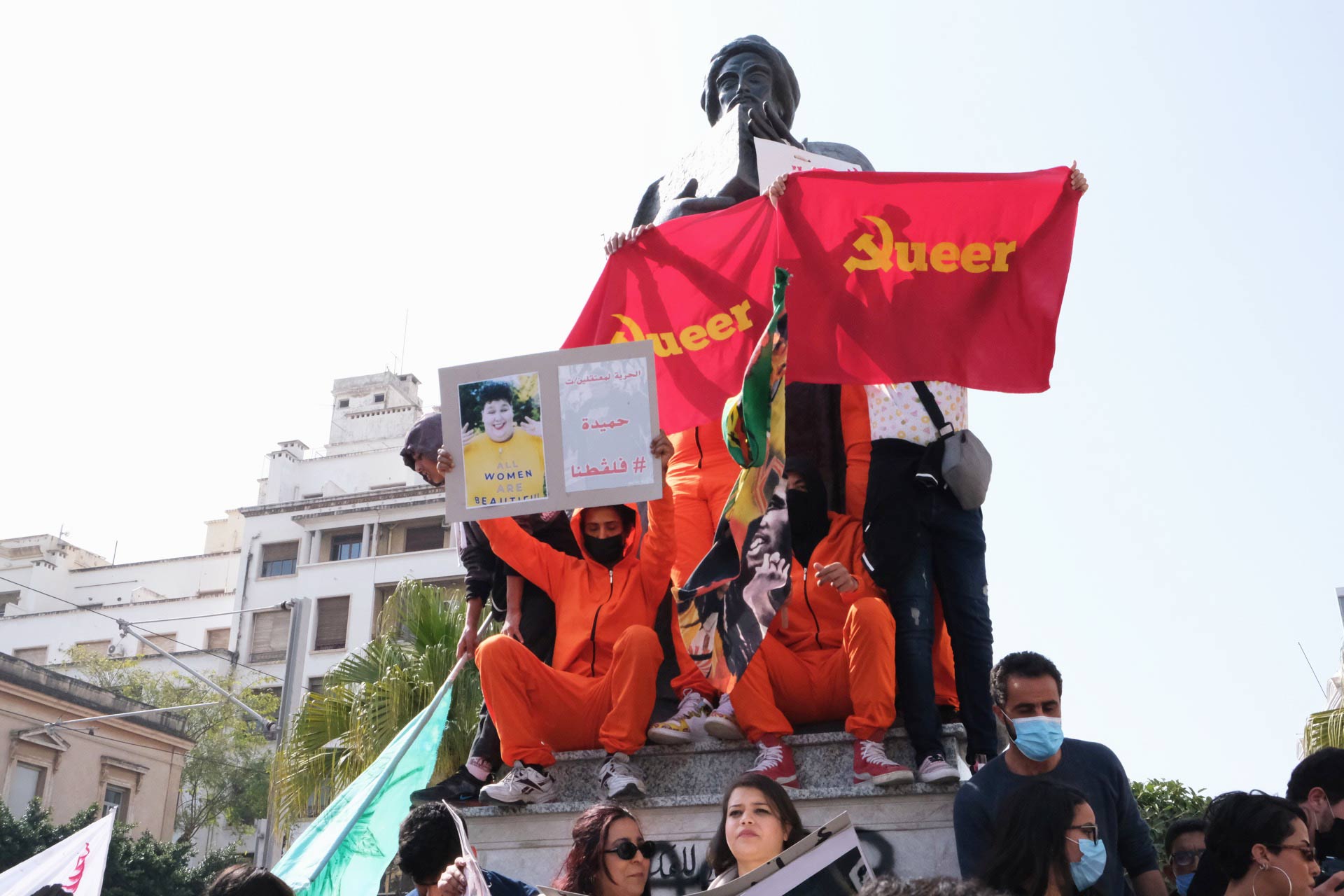
Demonstration on March 6, 2021, at Ibn Khaldoun Square on Habib Bourguiba Avenue in Tunis, in support of Rania Amdouni. Activists wave queer communist flags. Photo credit: Nissim Gasteli.
an activist alliance
An alliance between queer and left-wing activists sprang up during these protests, says Hamza. He explains that when certain people tried to keep queer activists out of protests, young leftists showed up to oppose this. To them, queer associations played a central role, " we hosted the preparatory meetings at our headquarters, and our lawyers defended the people participating in the protests. This is also what legitimised our role in the struggle, and what consolidated the community and made it more visible".
So when Rania was arrested, a lot of diverse support emerged from institutional civil society organisations not only connected to queer activism, such as from " Jil el Khata", an anti-fascist activist group. This collective is particularly opposed to institutional violence and police impunity, and subscribes to an intersectional approach. They also demanded the repeal of articles 230, 226 (concerning " public indecency") and law 52 (notably concerning the penalisation of drug use), in addition to numerous other demands of a socio-economic nature.
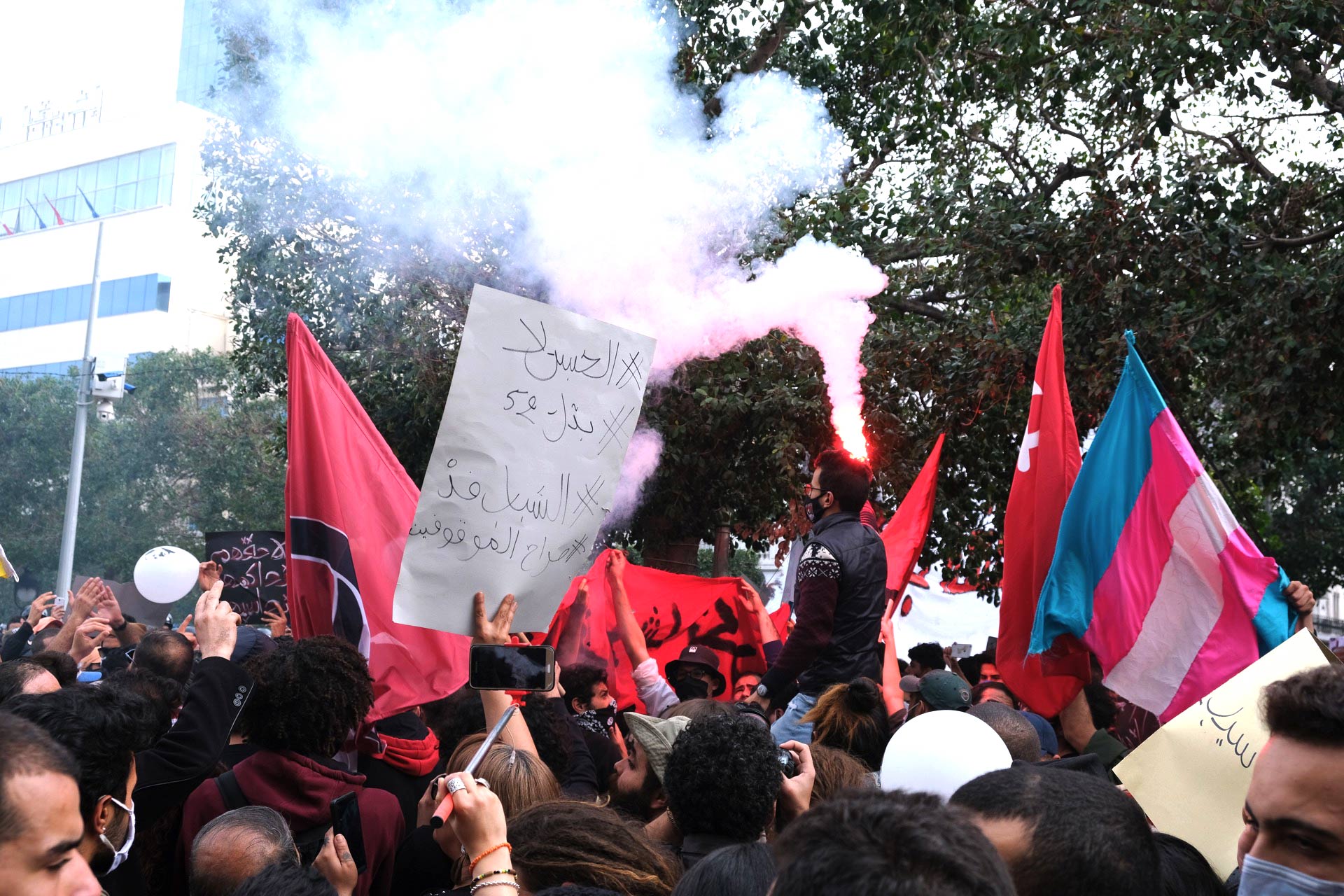
Protest in Tunis on February 6, 2021. Activists wave various flags including the transgender pride flag and the anti-fascist flag. Photo credit: Nissim Gasteli.
Protest in Tunis on February 6, 2021. Activists wave various flags including the transgender pride flag and the anti-fascist flag. Photo credit: Nissim Gasteli.
According to Abir Kréfa, this convergence between various civil society movements can also be explained by the openness of left-wing organisations to queer and feminist activists. " What's different to previous generations is that we now have generations on the left, on the far left and in youth organisations that are more open to questions concerning gender and sexuality", she explains.
"This willingness to build a unified movement, bringing together all these groups who are subjected to police repression in various ways, who come from different social classes, who are not politicised - all engaged in the same way... I think this is something that has been particularly worrying for the government and the state."
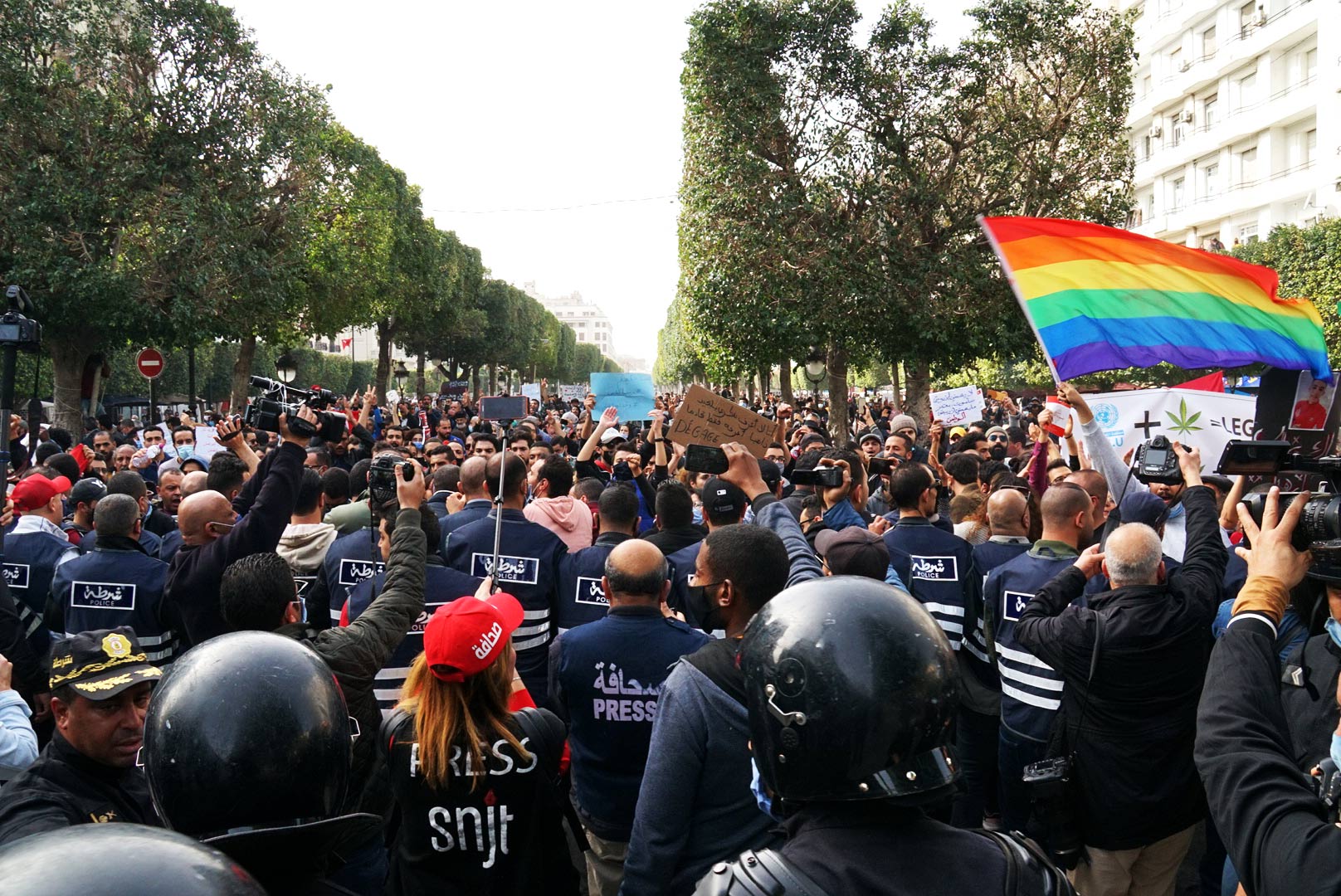
Démonstration at Habib Bourguiba Avenue. February 6, 2021. Photo credit: Issa Ziadia.
Démonstration at Habib Bourguiba Avenue. February 6, 2021. Photo credit: Issa Ziadia.
REPRESSION, VIOLENCE AND HARASSMENT AGAINST PROTESTERS
During recent demonstrations, nearly 1,000 people were arrested according to the authorities, while the associations report that nearly 2,000 arrests. Numerous reports denounce the arbitrary arrests and the violence committed by the police.
On October 6, 2020, Saif joined the protests against the bill to protect law enforcement and testifies that he was attacked and violently beaten by seven police officers. " They hit my leg, eye and jaw. They fractured my shoulder and broke my nose", he says. He explains that he was taken to the station where he was prevented from contacting a lawyer for three hours. He was released without prosecution, but the harassment continued as Saif was repeatedly arrested: five times in total between October 2020 and the end of January 2021.
According to Insaf Bouhafs, coordinator of the LGBTI programme of Lawyers Without Borders (LWB), the organisation has reported nine queer activists who were arrested and/or assaulted on the protest sidelines. Among them, 7 were arrested, 4 were detained and 1 was imprisoned: Rania Amdouni.
Multiple intimidation methods are frequently employed by the police, as was the case with Rania, who has been subject to abuse for over a year. When she was arrested, she was in the middle of filing a complaint against some police officers who had insulted
and humiliated her, a final and further form of assault that is far from being an isolated incident. This latest incident is merely part of the ongoing wave of harassment that Rania has been enduring since December 2019.
Through the testimonies of her lawyer, her comrades and friends (Hamza and Saif), as well as interviews with Rania herself before she was imprisoned, Inkyfada tries to reconstruct the key moments of the process of institutional violence that Rania has been subjected to for over a year.
Rania Amdouni has tried to file a complaint against police officers that continue to harass her several times. However, none of her complaints have been filed and none of the police officers have been inconvenienced, says one of her lawyers, Hela Ben Selem.
On February 27, she suffered yet another humiliation at the hands of police officers, which prompted her to make another attempt at filing a complaint. " It was too much for Rania, she was desperate. She could no longer bear the insults, the harassment, and the moral harassment that she was subjected to on a daily basis by the police and people in the street", says Hela Ben Selem.
When she arrived at the station, Rania was shunned by the officers who did not take her request seriously. She lost her temper, and was arrested and detained for "insulting a public officer or the like" in accordance with Article 125 of the Penal Code.
" Citizens are always prosecuted under article 125, yet we have never had police officers convicted for insulting a citizen. They have complete impunity", her lawyer notes.
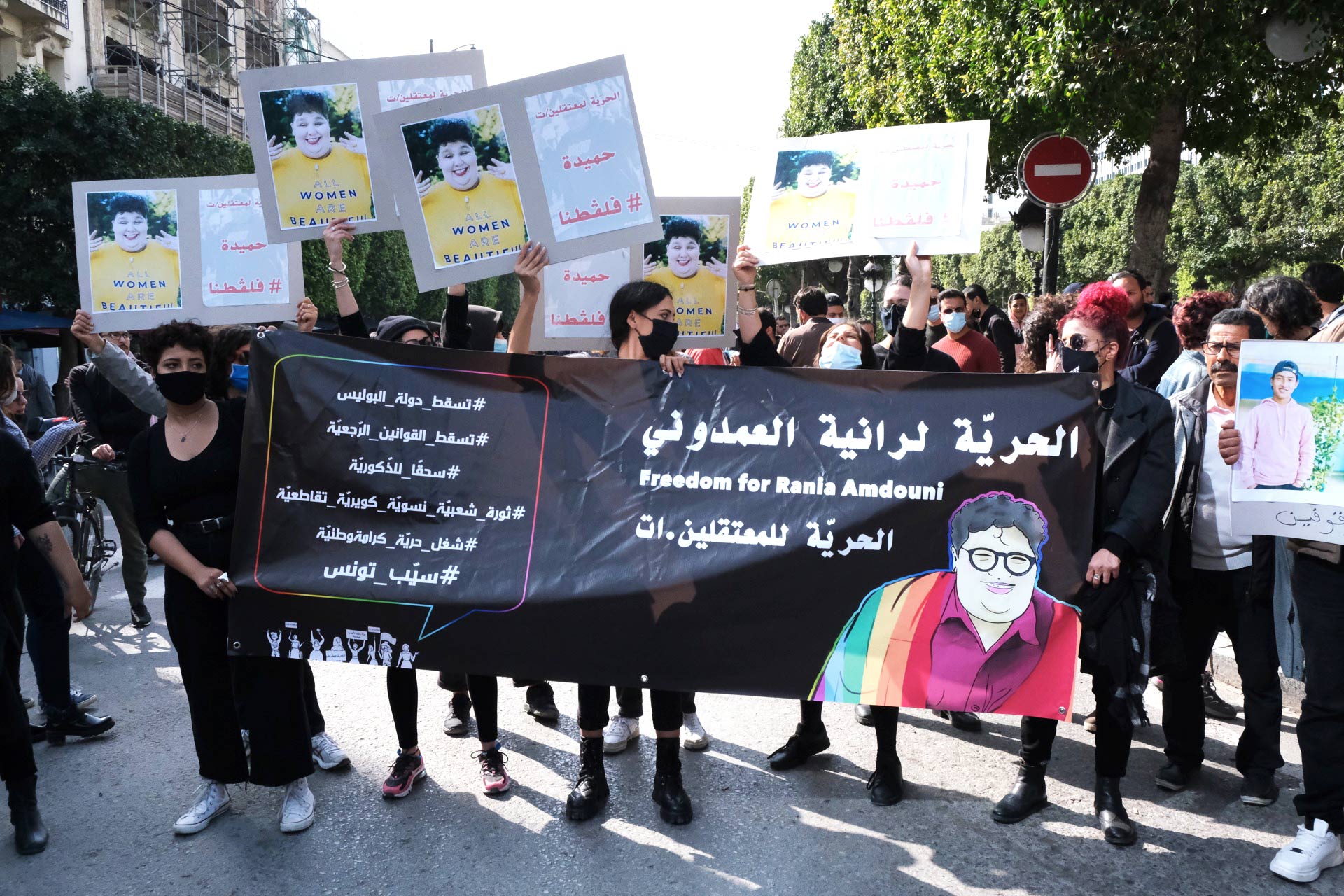
Demonstration on March 6, 2021, to demand the release of Rania Amdouni and other protesters arrested during the demonstrations. Photo credit: Nissim Gasteli
Demonstration on March 6, 2021, to demand the release of Rania Amdouni and other protesters arrested during the demonstrations. Photo credit: Nissim Gasteli
According to Saif, Damj has recorded about 120 posts inciting hatred towards queer people on the Facebook pages of police unions since the beginning of the protests. He explains that they disclose the identity of queer people by posting their photo or address. This is what Rania suffered through: " her photos were shared on their pages, and she was subjected to an entire denigration campaign on Facebook", explains Hela Ben Salem.
In addition, activists are being " forced out". Hamza describes how police officers have gone to the homes of Damj beneficiaries for the purpose of revealing their sexual orientation to their parents. " If they come across someone who is affected by this and whom it will harm, they take advantage of the opportunity even more", he adds. According to sociologist Abir Kréfa, " police violence targeting queer activists is accompanied by further forms of violence".
"Police officers expose queer activists to common forms of violence, domestic violence and other sources through forcibly outing them or publishing private information on social media. This is what is specific to LGBT activists compared to other groups in the civil society movement", she adds.
According to this researcher, in addition to the violence that took place on the sidelines of these protests, " repression of queer people is a daily occurrence. There are merely times when it intensifies and the methods diversify, as well as the scope of people affected."
On Wednesday March 17, 2021, Rania Amdouni could be tried again. In front of the courthouse where her appeal is being tried, a rally is being organised to denounce both Rania's imprisonment and the wave of arbitrary arrests that have marked recent demonstrations. Their slogan: " Rania, une parmi deux mille, relâchez toutes les personnes arrêtées [Rania, one of two thousand, release all those arrested]".
[Update on March 17, 2021] Following her appeal, Rania Amdouni's prison sentence has been reduced to a fine of 200 dinars, according to information provided by Damj. The activist should be released later today.
